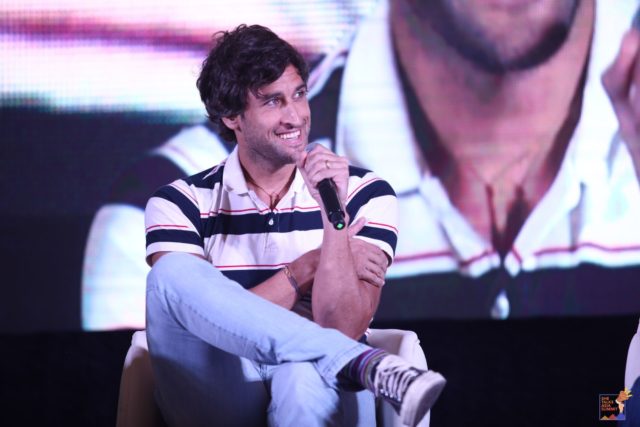
During the She Talks Asia Summit last Saturday, Nico Bolzico was asked about being a male feminist. He answered, “When it comes [to] feminism, when it comes to movements or whatever you call it, for me what I don’t like is to put a label. Oh you’re a feminist or you’re not feminist,” he said.
Nico said he feels like strong women are against men. “When you talk like a strong woman, you put like a label, you know like, ‘I am a strong woman, I am here.’ It’s kind of like, it happens that a lot of guys might feel like she’s against guys.” He added that putting a label like “feminism” only creates a divide in the world. “The more labels we put and the more differentiation we put in countries or religion, that is the worst or the wrong direction,” he said. “I mean I really support that but it’s not good for me when you talk like a strong woman, you put like a label.”
He also mentioned that he doesn’t like how Oprah Winfrey says that she’s a strong black woman. “The way she talks makes me feel like, you know, ‘I’m a black woman, first time standing here.’ You’re black and so what? I have a lot friends that are black, and will never differentiate them from anyone else. So, for me the way the message has been sent is wrong,” he said.
Yikes. OK, lots to unpack here.
Nico is clearly unaware of his privilege as a straight white man, and the advantages that come with it—as opposed to say Oprah, who came from a background of poverty and abuse and overcame the obstacles that come with working as a black woman in the entertainment industry at a time when diversity wasn’t a watchword.
Even in a pretty much mono-racial country like the Philippines, colorism exists—and that kind of nuance is missing in his argument, speaking as someone who experiences the world as a person of privilege.
Artist Nikki Luna tells us that this is an example of “someone who has an incredible misunderstanding of what being a feminists is all about.” She says, “Feminism is not wanting any woman/girl oppressed, we want them to have an equal footing in society. But he doesn’t believe in the systematic struggles women face.”
Unfortunately, Nico’s opinion is shared by many men—and women—who clearly don’t understand the meaning of feminism. So, we’re here to clear it up for you.
Let’s break it down:
Misconception: Feminism is about hating men.
The truth: Feminism is about equality. Period. Full stop. It’s about eradicating outdated notions of gender: that women can only do certain things, or a real man should behave a certain way. Feminism challenges these binary codes that define what it means to be masculine or feminine—and is predicated on the understanding that your gender shouldn’t be the basis of how you behave or present yourself to the world.
Bustle noted that “generalizations like ‘men are bad’ would actually fall under the category of ‘anti-feminist,’ since it is itself a gender stereotype. In fact, the cultural views of men as more aggressive, impulsive, and cold are just a few of the stereotypes feminism aims to combat.”
There are plenty of resources now that show that feminism is allowing boys and men to expand their notions of masculinity. That being vulnerable or softer doesn’t mean you’re weaker.
There are some good stories out now on what it means to be a man today and we recommend you read them: The Cut’s “Raise Your Son to Be a Good Man, Not a ‘Real’ Man” and The New York Times’ “The Boys Are Not All Right.”
Misconception: Feminism is about pushing the agenda of women only.
The truth: According to the dictionary, feminism is the “the advocacy of women’s rights on the basis of equality of the sexes.” It is about intersectionality and aims to give the marginalized—including the LGBTQ+ community—a voice, as well as the same opportunities as those who’ve ruled society (that would be dudes) since the beginning of humankind.
Misconception: Feminism is a label that we should be afraid of.
The truth: Gal Gadot said it best: “Every woman, every man, everyone should be a feminist. Because whoever is not a feminist is a sexist.”
Misconception: Men are excluded from the conversation.
The truth: Men must be part of the conversation. But women should lead this conversation because many men are born with privileges that women and other marginalized people don’t have. “We need to teach our boys to be feminists and we need to continue encouraging that value in men by including them in the conversation,” Huffington Post said. “We need men to help us with this fight because we need everyone fighting for this cause from all sides. Feminism benefits women as well as ALL people.”
Misconception: We don’t need feminism anymore.
The truth: Look around you—sexual harassment is still prevalent, rape culture is thriving, and we have world leaders who are either grabbing p*ssy or making rape jokes. Not to mention there’s still the issue of the gender pay gap, same-sex marriage isn’t legalized in several countries yet, and trans women are not allowed in women-only environments. Feminism exists because these issues still plague us.
***
That’s just some misconceptions that we got from Nico’s initial response. Although he’s optimistic that men and women should be on the same team, his statement can still be seen as somewhat problematic. We reached out to him after the conference and he clarified that he’s not against feminism. “I am for the feminist movement and supporting women, 100 percent,” he tells us.
If there’s one thing that he would change, it’s that women should encourage men more to join the cause. “I understand that women should be strong. But I wish that they should invite more men because they should be feminists, too. If you’re a man and you don’t support feminism, you’re not a man.”
Nico’s statement may have come from a good place, but his words seem to belie his intentions. Men should be feminists, no questions asked. It’s not the women’s responsibility to encourage them. If men wanted to join the cause, they should make the effort.
As for his comments on labeling, Nico stands by it and said that he wasn’t pertaining to feminism. “What I meant is that I don’t see anyone as white or black. We should be one people. The more labels we put, the more it divides society,” he said. However, in reality, discrimination in race and gender is still a problem. There are no grey areas, it’s either you stand with the marginalized or not.
Nico also admitted that what he said during the She Talks Asia Summit can easily be misconstrued. “My intentions weren’t to hurt anyone. I admit that a lot of conflict that’s happened to me is due to miscommunication,” he said.
Nevertheless, it’s still important that we continue to openly dialogue about feminism. Fellow SheTalks panelist Quark Henares said, “The whole point of She Talks Asia Summit was to create an inclusive and safe dialogue about topics such as feminism, empowerment, and intersectionality.” Likewise, She Talks Asia released a statement saying, While there were opinions mentioned that we don’t agree with, we are grateful that the summit served as a platform to tackle confronting issues. We hope that it will enable even more difficult conversations to take place, so we can jointly elevate the discourse.”
Plus, this should continue even outside the Summit because feminism is one of the effective ways we can take down the patriarchy and the status quo.
Photo courtesy of Wandersnap
Follow Preen on Facebook, Instagram, Twitter, and Viber
Related stories:
The One Thing Nico Bolzico and Solenn Heussaff Always Fight About
The Best of Nico Bolzico: A List of His Funny Videos for Your Viewing Pleasure
The Importance of Teaching Feminism at a Young Age
Our Top 5 Reasons Why Oprah Should Be US President


